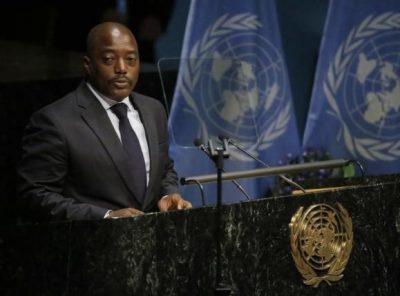Carlo Allegri/Reuters
By
Byobe Malenga
Sanctions and international pressure have increased on President Joseph Kabila of the Democratic Republic of Congo (DRC). Accused by the opposition of not wanting to retire after the end of his last term in December 2016, the United States and MEPs have decided to also extend warnings against the Congolese authorities.
The opposition denounced the amendment to the electoral calendar as a maneuver of the Congolese President to stay in power beyond his term. Joseph Kabila could have expressed himself on the matter. He never did. And that’s why the MEPs have criticized the head of state in a statement of Parliament urging armed groups to end the violence, but President Kabila needs to clarify his intentions. Joseph Kabila “is required to resign December 20, 2016 as the office of the President of the DRC is limited to two terms under the Congolese Constitution,” explained MEPs. “By not yet declaring he will, President Kabila is only exacerbating political tension in the country.”
However, US sanctions have apparently been taken seriously by the head of state himself. For, behind the police violence denounced by the United States, there are of course blocks in the electoral process, and disorder in the Congo. With little to say previously on the matter, Joseph Kabila broke his silence during a visit to Kalemie, promising elections and asking the Congolese to “prepare for the electoral process, which starts in July.” The speech was meant to be reassuring, but no date or deadline were announced by the Congolese President, leaving again confusion over the date of the elections and doubt as to how quickly the voting process can be organised.
DRC to become a new Burundi?
Contrary to the US, the EU are still reluctant to punish Congolese officials, Paris, Brussels, London and Madrid all struggling to agree on a common strategy. This is a boon to Joseph Kabila, for the heads of all European states still resonate over the Burundi fiasco. The international community has indeed been embarrassed by President Nkurunziza who ran for a disputed third term, won in highly questionable circumstances. Since then, Burundi has sunk into a spiral of violence between pro and anti-Nkurunziza supporters. Following the failure of Burundi, the international community has no room for error. Allowing Joseph Kabila to remain in power would be a very bad signal to the rest of Africa where it remains a struggle for political power to be implemented.
In this context, will international pressure succeed in persuading Joseph Kabila not to run for a third term? Nothing is certain. Pressed on all sides to organize elections as soon as possible, Kabila continues to play his role as President. Worse, his relatives brandish the idea of holding a referendum to force Kabila to power in 2016. With a possible amendment of the Constitution, that seems implausible. With what money will these be conducted though, as we know the INEC already lacks the means to organize elections? The referendum strategy looks like a headlong rush for him, even within the presidential majority. The bet is risky and dangerous, especially when popular opposition demonstrations are becoming more pressing.
With simple pressure and threats of targeted sanctions, there is little chance that Joseph Kabila will change his strategy to maintain power. The Congolese President clings to the Burundi case, but also that of its neighbor to Brazzaville, Denis Sassou Nguesso, including a referendum that allowed him to run for the much desired third term. Joseph Kabila consults regularly on the issue, and Sassou has no interest in his neighbor stumbling.
Kanyama
The first victim of the international community’s wake up call in the DRC is Celestin Kanyama, the head of the Congolese police in Kinshasa. Nicknamed “spirit of death” by opponents of power, General Kanyama is accused by US authorities of being “responsible or complicit in acts of violence on women and children as well as kidnappings.” As kingpin of the violent police crackdown to every opposition demonstration in the streets of the Congolese capital, the police chief last week saw his assets in the US frozen by the US Treasury. “Any US entity” is also forbidden to make transactions with the Congolese officer.
Washington accuses Celestin Kanyama of a leading role in the political violence in the DRC. “Death Spirit” was the operation in the violent repression of demonstrations against the electoral law of January 2015. A mobilization that ended in a sad result: at least 40 dead according to international NGOs. Kanyama was also head of the police during the infamous “Operation Likofi”, the supposed fight against crime in Kinshasa. Again, the toll was heavy: about fifty people killed and thirty missing. US sanctions are clearly a warning to leaders of the Congolese security services. Also in the sights of US authorities, the boss of the National Intelligence Agency (ANR), Kalev Mutond. These sanctions do not worry about power. Can Ministers be the next target?
With Celestin Kanyama, the United States certainly tapped the wallets of a senior Congolese, but currently no policy has yet been announced. Especially as some sources in Kinshasa state that Kanyama could soon be released by the authorities, as was the case in the time of John Numbi, also chief of the police and involved in the assassination of the famous activist rights man Floribert Chebeya. Numbi was removed from office where he returned to his native Katanga. The same fate could be reserved for the “fuse” Celestin Kanymama. Meanwhile, he has not yet decided to completely let go of power since a protest march to the police boss had been organized on Tuesday in the capital. The government also ordered the freezing of Kanyama’s assets, “an attack on the sovereignty” of the Congo that might “jeopardize bilateral relations,” said the government in a statement.



No Comments Yet!
You can be first to comment this post!